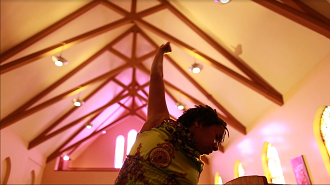
Manifest Destiny Jesus 2021
Distributed by New Day Films, 350 North Water Street Unit 1-12, Newburgh, NY 12550; 888-367-9154
Produced by T. Gernoimo Johnson, Daemond Arrindell, and Josh Aaseng
Directed by Josh Aaseng, Daemond Arrindell, and T. Geronimo Johnson
Streaming, 41 mins
General Adult
Diversity; Gentrification; Racial Relations; Religious Studies
Date Entered: 09/26/2022
Reviewed by Kathleen Hale, Supervisor for Public Services, State Library of PennsylvaniaI like the voiceover in the beginning saying that it is in memory of White Supremacy. It sets the tone for what the audience is to expect for the rest of the film.
The subject of this film is how gentrification has changed neighborhoods in Seattle, Washington. A church in south Seattle looks at the image of Jesus and how that affects the people who have lived there before the gentrification of this neighborhood began. Interviews with people of the various south Seattle institutions illustrate how the racism and the “white Jesus” affects their lives. Uses of various interviews with religious leaders of the area, business leaders, and a sociologist talk about how the idea of the “white” Jesus has affected the population in this neighborhood. The use of music is very effective to show the tension that the people are feeling. Historical footage interjected throughout the film show the perspective to support the point of view of the film. Especially affective is the overlaying of the traditional figure of Jesus with a Black person reading out of the Bible and the shot finishing with the Black person as to what Jesus could have looked like. The information portrayed in the film really points out how gentrification and changing neighborhoods affect the people who worship at a church. The film sometimes jumps around between the political subject of segregation of the city of Seattle and the religious subject of how white supremacy has affected religious institutions. The film should be for high school ages or higher.
This film could be used in a curriculum about religious studies, urbanization, diversity. It might not be for a public library because of the subject of religion. It would be good for churches to buy for starting conversations about changes in their places of worship.
Awards: Audience Choice Award, 2021 DC Black Film Festival
Published and licensed under the Creative Commons Attribution 4.0 license. Anyone can use these reviews, so long as they comply with the terms of the license.